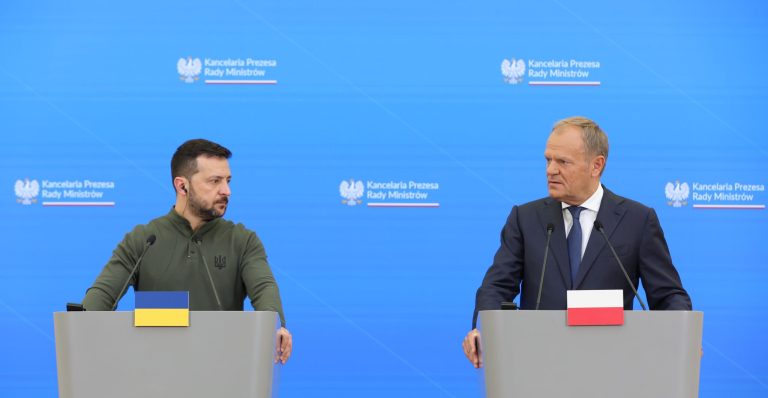Disputed chamber of Polish Supreme Court upholds PiS appeal against state funding cut
Keep our news free from ads and paywalls by making a donation to support our work!

Notes from Poland is run by a small editorial team and is published by an independent, non-profit foundation that is funded through donations from our readers. We cannot do what we do without your support.
The Supreme Court has overturned a decision by the National Electoral Commission (PKW) to reject the opposition Law and Justice (PiS) party’s financial report and cut its public funding. It found that the PKW did not properly substantiate its claims of irregularities in campaign spending by PiS.
However, the decision was made by a chamber of the court regarded as illegitimate by the PKW, by Poland’s government and by the European Court of Justice (ECJ) because it is staffed by judges appointed through a body that was brought under political control during PiS’s time in power.
Rzecznik SN: treścią dzisiejszego orzeczenia Sądu Najwyższego jest uchylenie postanowienia PKW, to oznacza, że PKW jest zobowiązana do przyjęcia sprawozdania wyborczego PiS. (PAP) pic.twitter.com/2gFfVohZbq
— PAP (@PAPinformacje) December 11, 2024
In August, a narrow majority of members of the PKW voted to reject PiS’s financial report for last year’s parliamentary elections after identifying irregularities in spending during the campaign. As a result, it reduced PiS’s state subsidies by tens of millions of zloty for the coming years.
PiS appealed against that decision to the Supreme Court. Under rules introduced when PiS itself was in power, such appeals are considered by the court’s chamber of extraordinary review and public affairs, which was itself created by PiS.
However, the PKW submitted a request to the Supreme Court asking that judges who were appointed after PiS overhauled the National Council of the Judiciary (KRS) – the body responsible for nominating judges – be excluded from ruling on the appeal.
In 2017-18, the KRS was reconstituted to give politicians, rather than judges themselves, the right to choose most of its members. The ECJ, European Court of Human Rights and even the Supreme Court itself have found that this rendered the body to no longer be independent of political influence.
A chamber of the Supreme Court created by the former PiS government is „not a tribunal established by law”, the EU’s top court has found.
The same chamber is due next month to rule on the validity of the recent elections at which PiS lost power https://t.co/gXgHSobD8C
— Notes from Poland 🇵🇱 (@notesfrompoland) December 22, 2023
All members of the chamber of extraordinary review and public affairs were appointed by the KRS after it was overhauled by PiS. Such officials are often referred to as “neo-judges”.
In two decisions issued yesterday, the chamber first rejected the PKW’s request to exclude “neo-judges” from the case and then announced that it had accepted PiS’s appeal against the PKW’s decision to reject the party’s financial report.
Supreme Court spokesman Aleksander Stępkowski – who, like the court’s chief justice, Małgorzata Manowska, is a “neo-judge” – said that the PKW has “in no way indicated how it made the findings on which its decision is based”, reports broadcaster TVN.
In a more detailed justification published on its website, the Supreme Court likewise outlined how the PKW had offered only a “very general” and “arbitrary” explanation of its decision, making it “impossible to conclude what specific factual circumstances led…[it] to reject [PiS’s] financial report”.
Poland’s electoral commission has rejected the PiS party’s financial report on its campaign for last year’s elections after identifying spending irregularities.
As a result, the former ruling party will lose tens of millions of zloty in public subsidies https://t.co/cedrmFeQPr
— Notes from Poland 🇵🇱 (@notesfrompoland) August 29, 2024
Stępkowski said that the PKW is now “obliged to pass a resolution accepting [PiS’s financial] report”. However, a member of the PKW, Ryszard Kalisz, has previously said that they would regard any decision by the Supreme Court chamber as “non-existent” because it would be made by “people who are not judges”.
So far, the PKW has responded to the ruling simply by saying that it will analyse the decision once it receives all the documents from the Supreme Court. The finance ministry – which is responsible for paying out public subsidies to political parties – says it will abide by whatever decision is made by the PKW.
PiS chairman Jarosław Kaczyński hailed the Supreme Court’s decision but said that “the question remains whether the current government will implement it or will the law be broken once again”.
A PKW source told the Polish Press Agency (PAP) that the electoral commission is likely to effectively accept the Supreme Court’s decision, as it has done in the past, because, despite the presence of improperly appointed judges, the PKW accepts that there must be a judicial body overseeing elections.
Dla Ministerstwa Finansów wiążące są decyzje PKW – poinformował resort. Odpowiedział w ten sposób na pytanie, czy dokona wypłaty subwencji dla PiS po decyzji Sądu Najwyższego.https://t.co/tsIqEyWJqY
— tvp.info 🇵🇱 (@tvp_info) December 11, 2024
In theory, the Supreme Court’s ruling will also impact on a separate but related decision made by the PKW in November to reject PiS’s entire financial report for 2023, based on the same alleged irregularities. As a result, the party was set to lose even more of its public subsidies.
The November decision was made on the same basis as the August one, meaning that it appears likely to also be rejected by the Supreme Court.
The outcome will have an impact on next year’s presidential election. PiS would find it much harder to fund the campaign of the candidate it is supporting, Karol Nawrocki, if its public subsidies are cut.

Notes from Poland is run by a small editorial team and published by an independent, non-profit foundation that is funded through donations from our readers. We cannot do what we do without your support.
Main image credit: Penn State University/Flickr (under CC BY-NC 2.0)

Daniel Tilles is editor-in-chief of Notes from Poland. He has written on Polish affairs for a wide range of publications, including Foreign Policy, POLITICO Europe, EUobserver and Dziennik Gazeta Prawna.






